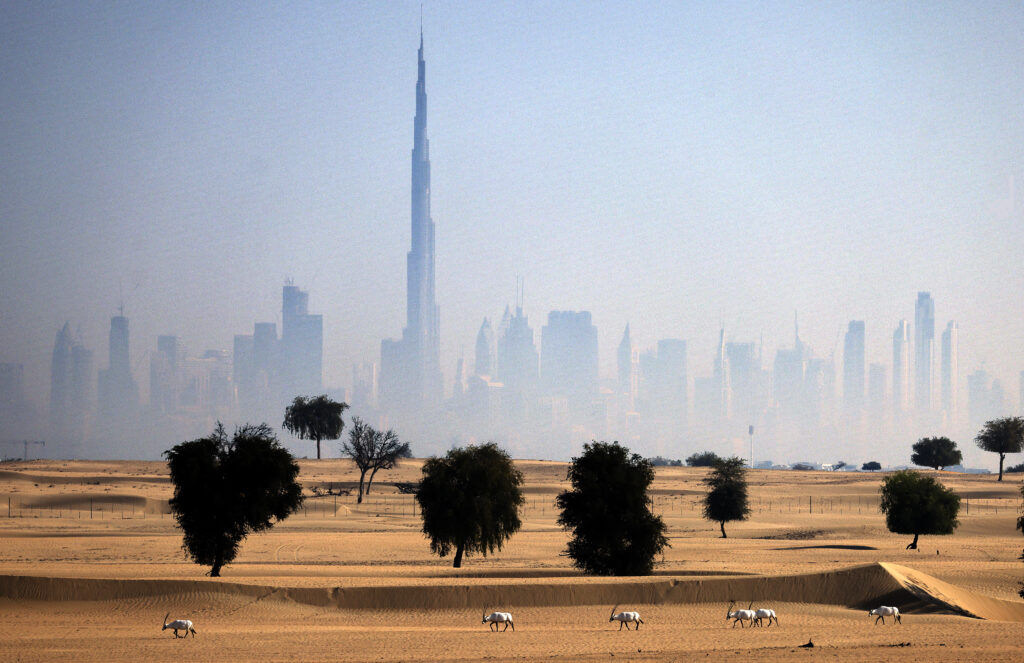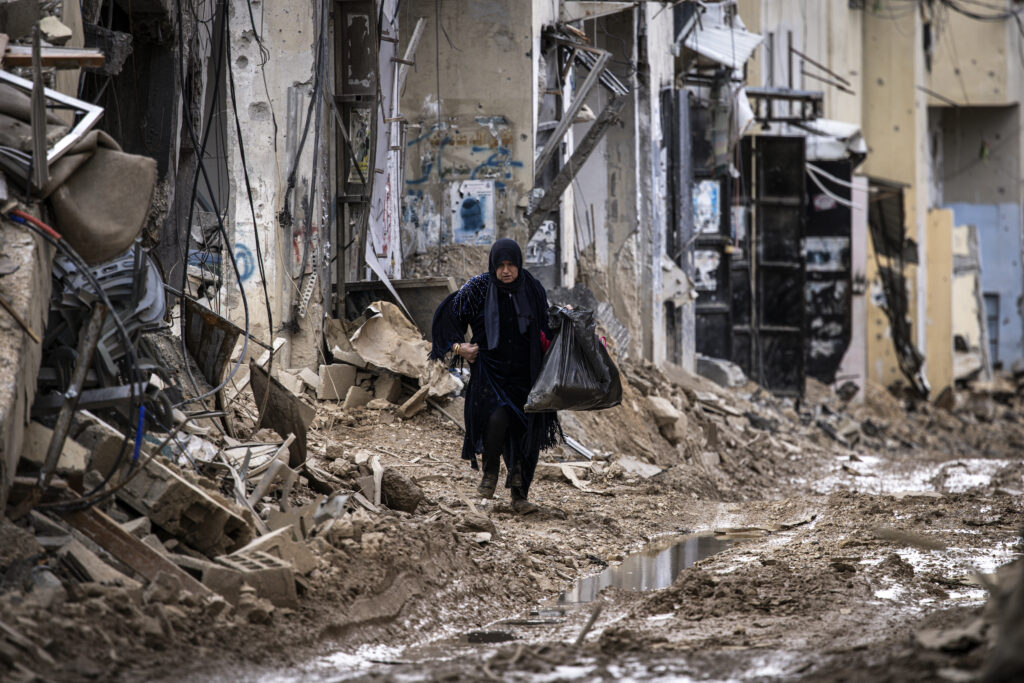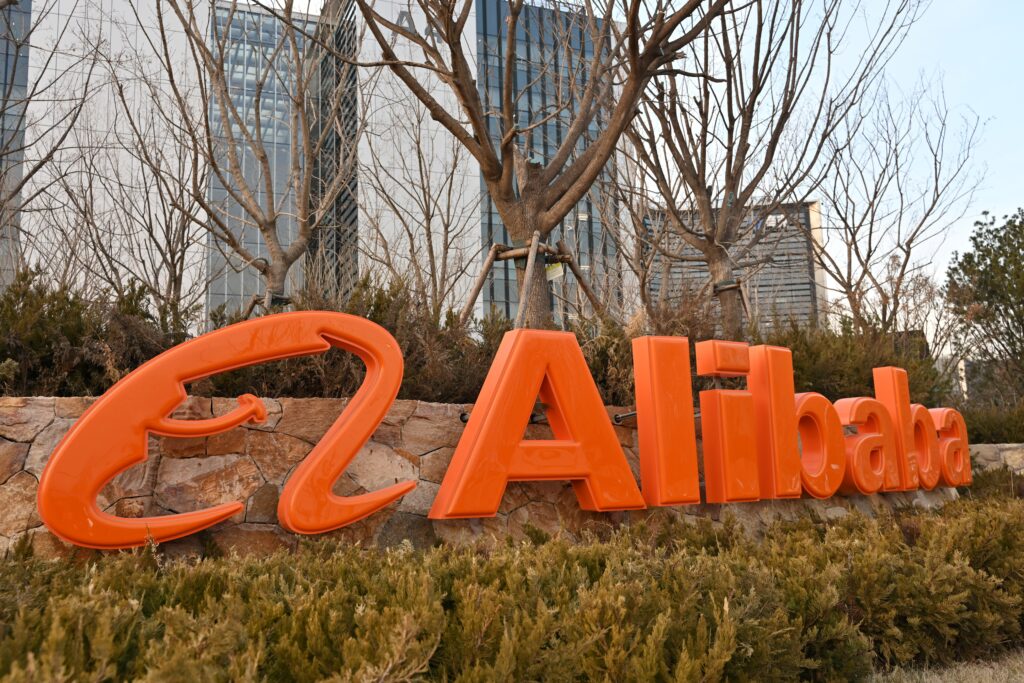AFP Asia Business
S. Korea’s central bank cuts rate, growth outlook over tariff fears
South Korea’s central bank on Tuesday slashed interest rates and its annual growth forecast as it looks to bolster the economy in the face of US tariffs and the fallout from President Yoon Suk Yeol’s brief declaration of martial law last year.Asia’s fourth-largest economy expanded less than expected in the final three months of 2024 …
S. Korea’s central bank cuts rate, growth outlook over tariff fears Read More »
Stuck in eternal drought, UAE turns to AI to make it rain
In the marbled halls of a luxury hotel, leading experts are discussing a new approach to an age-old problem: how to make it rain in the UAE, the wealthy Gulf state that lies in one of the world’s biggest deserts.Decades of work and millions of dollars have been ploughed into easing endless drought in the oil-rich UAE, whose mainly expatriate population is soaring undeterred by a dry, hostile climate and hairdryer summer heat.Despite the United Arab Emirates’ best efforts, rainfall remains rare.But at last month’s International Rain Enhancement Forum in Abu Dhabi officials held out a new hope: harnessing artificial intelligence to wring more moisture out of often cloudless skies.Among the initiatives is an AI system to improve cloud seeding, the practice of using planes to fire salt or other chemicals into clouds to increase rain.”It’s pretty much finished,” said Luca Delle Monache, deputy director of the Center for Western Weather and Water Extremes at the University of California San Diego’s Scripps Institution of Oceanography.”We’re doing the final touches.”However, Delle Monache conceded that AI was not a “silver bullet” for the UAE, which like other countries has pursued cloud seeding for decades.Cloud seeding works by increasing the size of droplets, which then fall as rain. It’s estimated to increase rainfall by 10-15 percent, Delle Monache said.But it only works with certain types of puffy, cumulus clouds, and can even suppress rainfall if not done properly.”You’ve got to do it in the right place at the right time. That’s why we use artificial intelligence,” he added.- Prayers, applause -The three-year project, funded with $1.5 million from the UAE’s rain enhancement program, feeds satellite, radar and weather data into an algorithm that predicts where seedable clouds will form in the next six hours.It promises to advance the current method where cloud-seeding flights are directed by experts studying satellite images.Hundreds of such flights occur annually in the UAE. With only about 100 millimetres (3.9 inches) of annual rainfall, the UAE’s nearly 10 million people mainly rely on desalinated water, piped from plants that produce about 14 percent of the world’s total, according to official figures.The population is 90 percent foreign and has increased nearly 30-fold since the UAE’s founding in 1971. People are concentrated in the big cities of Dubai, Abu Dhabi and Sharjah, coast-hugging refuges from the vast Arabian Desert hinterland.However, the country still needs groundwater, replenished by rain and encouraged by a series of dams, for agriculture and industry. Although UAE officials say rain has increased, downpours remain so unusual that school children are known to burst into applause and rush to classroom windows for a better view.Rain, even the artificial variety, is exotic enough to be a leisure attraction: at Dubai’s Raining Street, visitors pay 300 dirhams ($81) to walk in fake drizzle. Ordering prayers for rain is a long-standing practice by the Gulf’s ruling families. The memorable exception was last April, when the heaviest rains on record shuttered Dubai’s major international air hub and flooded roads, paralysing the city for days. – ‘Very niche area’ -Searching for solutions, the UAE in 2017 started holding the rainfall forum, which has now seen seven editions. Its Rain Enhancement Program has handed out $22.5 million in grants over a decade.”When it comes to cloud-seeding this program here is the best in the world,” Delle Monache said at the forum, held near the presidential palace and next to the headquarters of ADNOC, the state oil firm.”It’s a very niche area in atmospheric science. There are few experts in the world and they’re pretty much all here now.”His team’s algorithm was not the only use of AI in discussion. Marouane Temimi, associate professor at Stevens Institute of Technology in New Jersey, outlined a US-developed system that uses machine learning to track the path and impact of storms in real time.However Temimi, like Delle Monache, was also cautious about AI solutions, warning there were clear limits. A lack of detailed data about cloud composition — a common problem, as monitoring equipment is expensive — hampers accurate predictions even with AI, Temimi said. “I would say we still have some work to do just because we have data, but not enough data to train models correctly,” he told AFP.Enthusiasm for AI was also tempered by Loic Fauchon, president of the World Water Council of government, commercial, UN and other groups. “Be careful. Try to find the right balance between artificial intelligence and human intelligence,” he told the conference.”Do not go too fast to artificial intelligence. Humankind is probably the best (option).”
Frankfurt stocks rise on German vote outcome
Frankfurt equities squeezed out gains Monday after conservatives led by Friedrich Merz won Germany’s national election, with investors hoping that Europe’s largest economy can emerge from recession.Elsewhere equities mostly slid with investors still concerned about the inflationary effect of US President Donald Trump’s plans to slap tariffs on various trading partners and their impact on …
Islamic Jihad says Israeli tanks part of ‘plans to annex West Bank by force’
Palestinian militants said on Monday that an unusual deployment of Israeli tanks in the occupied West Bank, part of a major offensive that has displaced tens of thousands, may be a step toward annexation.The torn-up streets surrounding the Jenin refugee camp in the territory’s north were empty on Monday, an AFP journalist reported, as three Israeli Merkava tanks stationed at higher vantage points overlooked the area.Displaced camp residents occasionally entered through a back alley to retrieve belongings from their homes.”We go back in to get things, whatever we can. We take the risk because we have to,” said 52-year-old Ahmad al-Qahrawi.”We had nothing when we left, no clothes, nothing. We go back to get clothes because it’s cold.”Israeli leaders have repeatedly pledged to annex at least parts of the West Bank, which has been occupied since 1967, but any such proposal has been met with strong opposition from Palestinians and much of the international community.In a weeks-long military operation in the north of the territory, launched around the time a truce took hold in the Israel-Hamas war in the Gaza Strip, Israeli forces looking for militants have cleared three refugee camps and deployed tanks in Jenin.Militant group Islamic Jihad said that the mass evacuations and first deployment of Israeli tanks in the territory since the early 2000s “confirms the occupation’s plans to annex the West Bank by force”.The group, which has fought alongside Hamas in Gaza and has a strong presence in the northern West Bank, denounced “a new act of aggression” which it said was “aimed at uprooting our people from their land”.The International Committee of the Red Cross said many residents who fled have taken shelter in “crowded mosques and schools”.The damage has hampered displaced residents’ “access to basic needs such as clean water, food, medical care and shelter”, and the winter cold “has made it more difficult to survive”, it added in a statement.- UN, EU concerned -The United Nations’ humanitarian agency OCHA said the military offensive “appears to exceed law enforcement standards” and has had severe consequences.”The continued use of lethal war-like tactics in residential areas is extremely concerning,” OCHA said.Throughout the Gaza war, violence in the West Bank — a separate Palestinian territory — has soared, as have calls to annex it, most notably by Israel’s far-right Finance Minister Bezalel Smotrich.Since the start of the war in October 2023, Israeli troops or settler attacks have killed at least 900 Palestinians, including many militants, according to the Palestinian health ministry.Palestinian attacks and clashes during military raids have killed at least 32 Israelis over the same period, according to official figures.UN chief Antonio Guterres on Monday rejected “calls for annexation” and said he was “gravely concerned by the rising violence”.EU foreign policy chief Kaja Kallas said that “we are closely watching developments, and cannot hide our concern when it comes to the West Bank.”Israel said on Sunday that its troops would remain for many months in the evacuated refugee camps in the northern West Bank — Jenin, Tulkarem and Nur Shams — aiming to “prevent the return of residents and the resurgence of terrorism”, according to Defence Minister Israel Katz.He put the number of displaced Palestinians at 40,000, the same figure provided by the United Nations which said the offensive has killed at least 51 Palestinians including seven children, and three Israeli soldiers.Islamic Jihad accused Israel of attempting to consolidate “military domination by creating settler corridors that reinforce the separation of West Bank cities and their camps”.The West Bank, excluding Israeli-annexed east Jerusalem, is home to around three million Palestinian as well as nearly half a million Israelis who live in settlements that are illegal under international law.Israeli tanks have not operated there since the end of the second Palestinian intifada, or “uprising”, in 2005.- Bus bombs -Last week, Israeli Prime Minister Benjamin Netanyahu ordered the army to step up its operations in the West Bank, after bombs had exploded on several empty buses in Israel, causing no injuries.Israeli officials said the explosives resembled those used by West Bank militants.Israeli government spokesman David Mencer said on Monday that dozens of “terrorists have been eliminated, hundreds of wanted terrorists arrested and multiple terror infrastructure attacked” across the West Bank.In both Tulkarem and Jenin, the army has demolished dozens of homes with explosives, opening up new access routes into the densely built camps.Armoured bulldozers have wreaked havoc, upturning tarmac, cutting water pipes and tearing down roadside facades.The military says the bulldozers are meant to clear roads of explosives.bur-az-lba-jd/ami
China’s Alibaba to invest $50 bn in AI, cloud computing
Chinese tech giant Alibaba said Monday it will spend more than $50 billion on artificial intelligence and cloud computing over the next three years, a week after co-founder Jack Ma was seen meeting President Xi Jinping.Investors have piled into Chinese technology stocks since the start of the year, with Alibaba — which runs some of …
China’s Alibaba to invest $50 bn in AI, cloud computing Read More »





